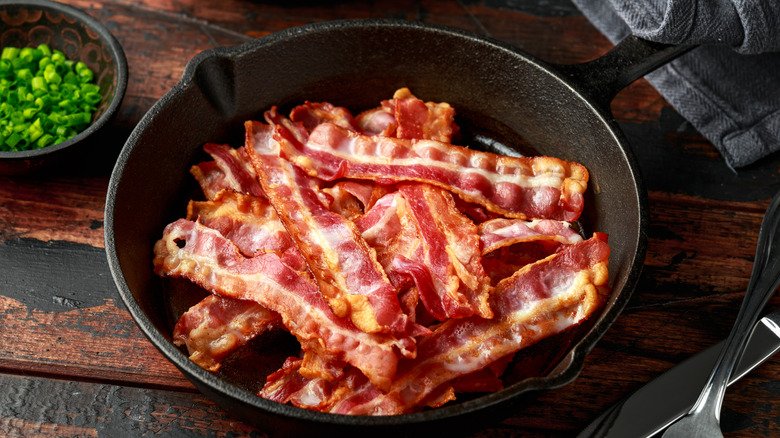Avoid This Kind Of Meat If You Want To Live Longer
Life expectancy has increased dramatically over the past century. Today, the average person lives 71.5 years or longer, reports Alumniportal Deutschland. One hundred years ago, most people lived only to the age of 30. Yet, diseases like cancer, diabetes, and dementia claim millions of lives worldwide. Each year, heart disease alone is responsible for one in every four deaths in the U.S., according to the Centers for Disease Control and Prevention.
On the positive side, most health conditions are preventable. A balanced lifestyle can significantly lower your risk of type 2 diabetes, stroke, lung cancer, obesity, and other life-threatening disorders. For example, a 2018 study published in the American Journal of Public Health explains that unhealthy behaviors, such as smoking and bad eating, contribute to disease onset and progression. Unfortunately, medications and supplements cannot cancel out the harmful effects of stress, added sugar, sleep deprivation, or lack of exercise.
Like with most things. it's all in the small details. Simple changes, such as cutting out sugar and processed foods, can make a world of difference. For starters, avoid this kind of meat if you want to live longer.
Processed meat can take years off your life
Ham, beef jerky, sausages, salami, and bacon are popular among dieters and gym-goers alike. Just think about the keto diet, which promotes the consumption of low-carb, high-fat foods. Moreover, beef jerky and other similar products are marketed as healthy snacks. They're tasty, convenient, and sugar-free, offering both flavor and nutrition. For example, turkey ham delivers over 14 grams of protein and only 214 calories per 3.5 ounces (per My Food Data). But it also provides more than one-third of the recommended daily sodium intake, plus large amounts of fat and dietary cholesterol.
Nutrition experts agree that processed meat is anything but healthy. The American Institute for Cancer Research (AICR) classified it as a Group 1 carcinogen, meaning that it's just as harmful as cigarettes. Researchers warn that processed meat can significantly increase cancer risk, even when consumed in small amounts. These food products contain nitrites, nitrates, and other chemicals associated with colorectal cancer, notes the AICR.
Bacon and other processed meats also pack large amounts of sodium, trans fats, and cholesterol, which may contribute to heart disease. High-sodium diets, for instance, can raise blood pressure and put you at risk for cardiovascular problems, stroke, and stomach cancer, reports the American Heart Association. On top of that, eating too much salt may cause fluid retention and affect your kidneys. A balanced diet should provide no more than 1,500 milligrams of sodium per day.
Fried meat may cause cell mutations
Fried and charred meats are just as harmful as processed meat products, warns the National Cancer Institute. When meat is cooked at high temperatures or for long periods, it releases heterocyclic amines (HCAs) and polycyclic aromatic hydrocarbons (PAHs). These chemicals can damage your DNA and cause cell mutations, leading to a higher risk of cancer. Their effects are dose-dependent.
While more research is needed to confirm these findings, several studies found a positive association between fried meat consumption and cancer risk. For example, a cohort study published in the journal Carcinogenesis suggests that people who eat fried meat regularly are at higher risk for lung adenocarcinoma. As the scientists note, fried meat contains acrolein, aldehydes, and other mutagenic compounds in addition to HCAs and PAHs.
Charred meat isn't safer either. "In epidemiology studies, increased risks have been observed with frequent consumption and larger portion sizes of well-done or charred meat cooked at high temperatures," says professor of oncology Christine Ambrosone, Ph.D. (via Roswell Park Comprehensive Cancer Center). She recommends adding rosemary, basil, sage, garlic, and other herbs or spices to grilled meat to reduce HCAs and PAH levels. Another trick is to use acidic marinades, suggests Dr. Ambrosone. Vinegar, lime, lemon, and other acidic ingredients can lower HCA formation by up to 99%. To stay on the safe side, opt for leaner cuts of steak or grill fresh vegetables and fruits instead of meat.



